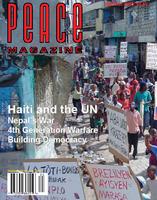
Peace Magazine Apr-Jun 2006, page 31. Some rights reserved.
Search for other articles by PMag staff here
Organizers for the World Peace Forum -- scheduled for 23-28 June in Vancouver -- are optimistic for the success of the event, despite recent setbacks in funding. Vancouver's City Council swung to the right in the November 2005 civic elections, and under Mayor Sam Sullivan, the new council has cancelled its previous financial support to two parts of the conference -- the meetings of the International Association of Peace Messenger Cities and of the Mayors for Peace network.
Among its other objectives, the World Peace Forum aims to "Make war abhorrent, peace popular, and the restoration and protection of our global ecosystems a priority." More details are available at www.worldpeaceforum.ca or at World Peace Forum 2006, 550 West 6th Avenue, Suite 420, Vancouver, BC V5Z 1A1 (tel 604 687 3223).
By the summer of 2007, Venezuela is likely to have the largest military reserve in the Americas, which is expected to be almost double the size of that in the United States.
The recruitment drive, which began in March this year with the training of 500,000 volunteers, is part of President Hugo Chávez's plan to create a people's army that would answer directly to him in the event of civil unrest or an armed conflict.
General Alberto Muller Rojas, one of the members of the army high command who helped to devise the new thinking in military strategy being adopted by Venezuela's leftwing government, said: "If for example the United States were to invade Venezuela one day, and that's what many people are expecting, the only way we could repel such an attack would be a full scale guerrilla war against the foreign aggressors.
"Our professional army only numbers 80,000 soldiers, so we would need to use civilians like in Iraq to fight the Yankee forces."
So far, service in the territorial guard is voluntary. But the Venezuelan parliament is studying proposals to make it obligatory for all Venezuelan adults to join the territorial guard.
Source: The Guardian
Slobodan Milosevic's death in prison on 10 March has meant that evidence given at his trial cannot be used in other cases at the International Criminal Tribunal for former-Yugoslavia. It has also had a negative impact on Bosnia's genocide case against Serbia at the International Court of Justice (ICJ: the UN-established body for disputes between states), which could have called on the Tribunal's findings had there been a verdict.
"He left when we needed him most," an ironic Zdravko Grebo, a Sarajevo law professor, told Bosnian television station Hayat on the day Milosevic died, summing up the frustration of many Bosnian citizens with the turn of events.
Many Bosnians had hoped that Milosevic would be found guilty of genocide before the end of 2006; that is, before the ICJ case would be adjudicated.
Source: Institute for War and Peace Reporting iwpr.net
The Liberation Tigers of Tamil Eelam (LTTE; known as the "Tamil Tigers") have been accused in a Human Rights Watch report of using extortion and intimidation against Sri Lankan Tamils in the diaspora, in particular those in Canada and the UK.
The report "Funding the 'Final War': LTTE Intimidation and Extortion in the Tamil Diaspora," details how representatives of the LTTE and pro-LTTE groups use unlawful pressure among Tamil communities in the West to secure financial pledges. People were told that if they did not pay the requested sum, they would not be able to return to Sri Lanka to visit family members. Others were warned that they would be "dealt with" or "taught a lesson." One Toronto business owner said that after he refused to pay more than $20,000, Tamil Tiger representatives made threats against his wife and children.
"The Tamil Tigers are exporting the terrors of war to Tamils living in the West," said Jo Becker, author of the report. "Many members of the diaspora actively support the Tamil Tigers. But the culture of fear is so strong that even Tamils who don't [support them] feel they have no choice but to give money."
The report can be downloaded at hrw.org/reports/2006/ltte0306.
Source: Human Rights Watch
Several human rights activists were detained in March after protesting at the forced eviction by riot police of elderly villagers in Pyongtaek, in the north west of South Korea. Their village is subject to an eviction order to allow for the expansion of a neighbouring US army base, Camp Humphreys.

Peace Magazine Apr-Jun 2006, page 31. Some rights reserved.
Search for other articles by PMag staff here